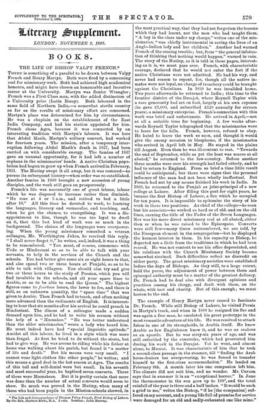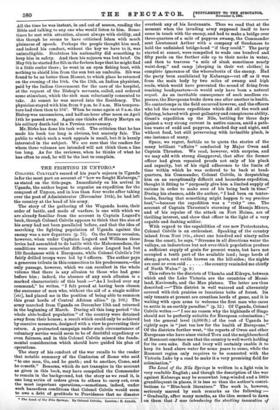BOOKS.
THE LIFE OF BISHOP VALPY FRENCH.*
THERE is something of a parallel to be drawn between Valpy French and Henry Martyn. Both were fired by a consuming
zeal for missionary work. Both had achieved high academical honours, and might have chosen an honourable and lucrative career at the University. Martyn was Senior Wrangler ; French was a First Class man, with the added distinction of a University prize (Latin Essay). Both laboured. in the same field of Northern India,—a somewhat sterile country as far as the results of missionary effort are concerned.
Martyn's place was determined for him by circumstances. He was a chaplain on the establishment of the East India Company, and had his station appointed for him.
French chose Agra, because it was connected by an interesting tradition with Martyn's labours. It was here that Abdul Masih, Martyn's solitary convert, had worked for fourteen years. The mission, after a temporary inter- ruption following Abdul Masih's death in 1827, had been carried on with considerable energy. The famine of 1837 gave an unusual opportunity, for it had left a number of orphans in the missionaries' hands. A native Christian popu- lation had begun to grow up when French arrived in February, 1851. The Mutiny swept it all away, but it was restored—to pursue its subsequent history—when order was re-established. Another famine in 1860 brought a new accession of young disciples, and the work still goes on prosperously.
French's life was necessarily one of great labour, labour which he was disposed to increase rather than diminish. "He rose at 4 or 5 a.m., and retired to bed a little after 10." All this time he devoted to work, to learning the languages, literary and vernacular, and teaching, and, when be got the chance, to evangelising. It was a dis- appointment to him, though he was too loyal to dwell on it, that this last kind of work was so much in the background. The claims of the languages were overpower- ing. When the young missionary consulted a veteran colleague, Mr. Worthington Jukes, he received this reply. "I shall never forget it," he writes, and, indeed, it was a thing to be remembered. " You must, of course, commence with Urdu or Hindustani so as to be able to talk with your servants, to help in the services of the Church and the schools. You had better give some six or eight hours to that, and also spend two or three hours at Punjabi, so as to be able to talk with villagers. You should also try and give two or three hours to the study of Persian, which you will find invaluble in the schools, and all your spare time to Arabic, so as to be able to read the Quran." The highest figures come to fourteen hours, the lower to ten, and there is still, as an unknown quantity, the " spare time " that was given to Arabic. Then French had to teach, and often nothing more advanced than the rudiments of English. It is interest- ing to hear that six months after his arrival he could preach in Hindustani. The illness of a colleague made a sudden demand upon him, and he had to write his sermon without the help of a " Moonshee." " He was better understood than the older missionaries," wrote a lady who heard him. He must indeed have had "special linguistic aptitude." Amidst all this labour, he lived in a style which was more than frugal. At first he tried to do without the siesta, but had to give way. He was averse to riding while his father at home was walking about his parish, but found it "a matter of life and death." But his means were very small. "I cannot wear light clothes like other people," he writes; and this means a good deal in the hot season at Agra. The results of this toil and self-denial were but small. In his seventh and most successful year, he baptised seven converts. Three of these were Moonshees. But it is pretty certain that more was done than the number of actual converts would seem to show. So much was proved in the Mutiny, when many of those who had been pupils in the Mission-schools showed, in • The Life and Correspondence of Thomas Valpy French, First Bishop of Lahore. By the Her. Herbert Birks, M.A. 2 vole. London John Murray.
the most practical way, that they had not forgotten the lessons which they had learnt, nor the men who had taught them.
"A boy in the class under my charge," writes one of the mis- sionaries, "was chiefly instrumental in saving the lives of an Anglo-Indian lady and her children." Another had warned French of the coming trouble ; but, from " the general infatua- tion of thinking that nothing would happen," warned in vain. The story of the Mutiny, as it is told in these pages, interest- ing as it is, we must pass over. French, with characteristic courage, declared that he would not enter the fort if the native Christians were not admitted. He had his way, and never had reason to repent, for, though all the native in- mates were not loyal, no charge of treachery could be brought against the Christians. In 1859 he was invalided home. Two years afterwards he returned to India; this time to the frontier district of the Derajat, where Reynell Taylor with a rare generosity had set on foot, largely at his own expense (he gave £1,000, and subscribed £120 annually for sixteen years), a missionary enterprise. French's connection with this work was brief and unfortunate. He arrived in April,—not at all a suitable time for beginning. A few weeks after- wards Reynell Taylor telegraphed that the missionaries were to leave for the hills. French, however, refused to obey.
He hated to leave the work so soon, and thought it would give the enemy occasion to blaspheme, if the missionaries who arrived in April left in May. He stayed in the plains till August. Even then he was ill-content to rest. "Towards the end of September, while as yet the heat was scarce at all abated," he returned to the low-country. Before another three months were over his strength had failed utterly, and he had to return to England. From so brief a time little result
could be anticipated; but there were signs that the personal influence of the man had not been wholly ineffectual. Bat French had not by any means finished his work in India. In 1869, he returned to the Punjab as joint-principal of a new college at Lahore. After filling this post for eight years, he became the first Bishop of Lahore, a See which be occupied for ten years. It is impossible to epitomise the story of his work in these two positions. As chief of the college—he soon lost his associate—he worked as hard as of old, and on the old lines, earning the title of the Padre of the Seven Languages. Nor was his more direct missionary zeal at all abated, either then or when he was raised to the Episcopate. Converts were still few—many times outnumbered, we are told, by the European element in the congregation—but he displayed the keenest interest in them. In his capacity as Bishop, be departed not a little from the traditions in which he had been reared. He was not content to see his office depreciated, and his relations with the Church Missionary Society became somewhat strained. Such difficulties reflect no discredit on either party. The great missionary societies were established before the days of Bishops. As they still, to a large extent, hold the parse, the adjustment of power between them and episcopal authority must be a matter of the greatest delicacy. Dr. French had to deal also with divergent opinions and practices among his clergy, and dealt with them, on the whole, with tact and charity. But of this enough ; we must hasten to the end.
The example of Henry Martyn never ceased to fascinate Dr. French. While still Bishop of Lahore, he visited Persia in Martyn's track, and when in 1889 he resigned his See and was again a free man, he emulated his great prototype in the most romantic adventure of his life. He was resolved to attack Islam in one of its strongholds, in Arabia itself. He knew Arabic as few Englishmen knew it, and he was as zealous as an apostle. But he was sixty-six years of age, and was still enfeebled by the sunstroke, which had prostrated him during his work in the Derajat. Yet he went, and almost alone, to Muscat. It was characteristic of him that he took a second-class passage in the steamer, till " finding the Arab horse-dealers too overpowering, he was forced to transfer himself to the first-class accommodation." He landed on February 8th. A month later his one companion left him. The climate did not snit him, and no wonder. Mr. Curzon says that in summer it is an "exceptional horror." In June the thermometer in the sun goes up to 189°, and the total rainfall of the year is three and a half inches. "It would be such a grief to me," writes the Bishop, "if he the companion] suf- fered on my account, and a young life fall of promise for service were damaged for an old. and sadly-exhausted one like mine."
All the time he was instant, in and out of season, reading the Bible and talking to any one who would listen to him. Some- times he met with attention, almost always with civility, and this though he seems to have criticised Islam with much plainness of speech. Perhaps the people thought him mad, and indeed his conduct, without the key we have to it, was unintelligible. Doubtless his nationality did something to keep him in safety. And then his sojourn was but brief. On May 6th he started for Sib in the forlorn hope that he might find it a little cooler there ; he went in an open fishing boat, with nothing to shield him from the sun but an umbrella. Sib was found to be no better than Muscat, to which place he returned on the evening of the 10th. On the 13th, an Indian physician, paid by the Indian Government for the care of the hospital, at the request of the Bishop's servants, called, and ordered some stimulant, which the sick man reluctantly consented to take. At sunset he was moved into the Residency. The physician stayed with him from 9 p.m. to 3 a.m. His tempera- ture had risen then to 104°. When he came again at 8 a.m. the Bishop was unconscious, and half-an-hour after noon on April 14th he passed away. Again one thinks of Henry Martyn on his solitary death-bed in a Persian caravansary.
Mr. Birks has done his task well. The criticism that he has made his book too long is obvious, but scarcely fair. The public to which such a work appeals is small, but it is keenly interested in the subject. We are sure that the readers for whom these volumes are intended will not think them a line too long. As for the reviewer, when he thinks of what he has often to read, he will be the last to complain.



















































 Previous page
Previous page